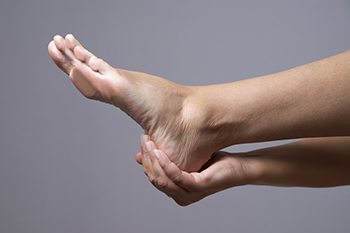
Many people who experience heel pain have developed a common condition called plantar fasciitis. But the same type of pain may also be the result of heel pad syndrome. The heel pad, medically known as corpus adiposum, is actually a number of fat chambers wrapped in connective tissue at the bottom of the heel bone. The heel pad serves as a kind of shock absorber every time you stand, walk, run, or jump. When you are young and healthy, the heel pad is thick and dense. But as you age, it becomes thinner and less elastic, thereby less able to absorb the same amount of force it once did. Patients with heel pad syndrome may have a bruised heel that is tender to the touch. Walking barefoot or on hard surfaces and carrying extra body weight can contribute to the pain. Adequate heel padding, heel cups, and proper footwear are ways of reducing the pain of heel pad syndrome. In some cases, non-steroidal anti-inflammatory medication can be a treatment option. A podiatrist can examine your heel to determine if heel pad syndrome is the cause of the discomfort and offer the appropriate treatment options.
Many people suffer from bouts of heel pain. For more information, contact one of our podiatrists of Sutera and Jones Surgical Podiatry. Our doctors can provide the care you need to keep you pain-free and on your feet.
Causes of Heel Pain
Heel pain is often associated with plantar fasciitis. The plantar fascia is a band of tissues that extends along the bottom of the foot. A rip or tear in this ligament can cause inflammation of the tissue.
Achilles tendonitis is another cause of heel pain. Inflammation of the Achilles tendon will cause pain from fractures and muscle tearing. Lack of flexibility is also another symptom.
Heel spurs are another cause of pain. When the tissues of the plantar fascia undergo a great deal of stress, it can lead to ligament separation from the heel bone, causing heel spurs.
Why Might Heel Pain Occur?
- Wearing ill-fitting shoes
- Wearing non-supportive shoes
- Weight change
- Excessive running
Treatments
Heel pain should be treated as soon as possible for immediate results. Keeping your feet in a stress-free environment will help. If you suffer from Achilles tendonitis or plantar fasciitis, applying ice will reduce the swelling. Stretching before an exercise like running will help the muscles. Using all these tips will help make heel pain a condition of the past.
If you have any questions please contact one of our offices located in Media, Glen Mills, Riddle Memorial Hospital, and Concordville, PA . We offer the newest diagnostic and treatment technologies for all your foot and ankle needs.
